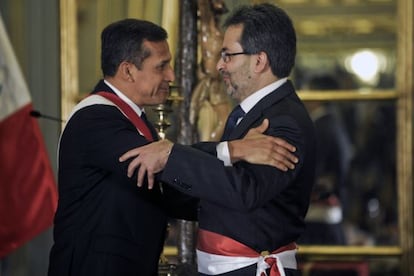Peru's Humala shuffles Cabinet
President tries to appease critics following deadly mining protests in Cajamarca

Facing growing pressure due to swelling opposition over a proposed gold mine, as well as fallout from the killings of five protestors during demonstrations, Peruvian President Ollanta Humala appointed a new Cabinet on Monday, going as far as replacing his prime minister, who was responsible for calling in police to quell the anti-mining marches.
Juan Jiménez Mayor, the third prime minister to take office this year, pledged to hold talks with citizens of Madre de Dios department, where protests have grown against the so-called Conga mine project, which is owned by the US Newmont Mining Co. of Colorado.
Many residents in the department's Cajamarca region are opposed to mining activities because they believe, among other things, that their drinking water will become toxic and their land will be ruined. The protests are being led by Cajamarca regional head Gregorio Santos.
"This will be a Cabinet of dialogue and discussions," Jiménez Mayor said in a televised statement after his swearing-in. "The rights of the people come first and, in the case of mining activities, water will be the number one priority. The government doesn't want more deaths; the government is looking for life."
Jiménez Mayor, who was justice minister, replaces General Óscar Valdés, who was harshly criticized for the deaths of five protestors that have taken place during the past few months.
Gold worth 1.22 billion euros was extracted from illegal mining last year
Humala also appointed six women to head up the ministries of Justice and Human Rights, Health, Education, Women's Affairs, Development and Social Inclusion, and Production.
The 3.9-billion-euro Conga mine is being backed by President Humala, who says it will pump hundreds of millions of dollars into the economy for the next 20 years.
Illegal and informal mining has destroyed thousands of hectares and has changed the landscape of Madre de Dios, says Dolores Cortés of the International Organization for Migration (IOM). The department is home to five indigenous groups and 32 native communities, some of which have never been contacted. Some 40,000 people from Peru and other countries, such as Brazil, Bolivia, Russia, China and South Korea, work directly in mining in Madre de Dios. A study by the firm Macroconsult concluded that some 1.6 million ounces of gold, worth 1.22 billion euros, were extracted from illegal mining activities throughout Peru last year.
Miners work under harsh conditions for 24 hours non-stop and then rest for 12 hours. They have no work contract or any type of social protection, and often become ill with lung and skin diseases. "In one week a miner can earn some 7,000 sols [2,180 euros] when the average salary is 2,000 sols [625 euros] a month," says Enrique Muñoz, a commissioner with the Public Ombudsman's Office.
If the illegal miners pay taxes on the 1.6 billion sols (500 million euros) in gold they extract a year just from Madre de Dios, the region would receive some 50 million sols (15.6 million euros) for infrastructure projects, according to calculations made by the Institute of Peruvian Amazon Investigations and the Environment Ministry.
The people of Huepetube, a town of about 8,000 residents, complain they have no potable water and are plagued by frequent power outages. They also quote government studies that local residents have higher levels of mercury in their blood streams.
Leber, 27, who heads a team of miners in nearby Sarayaku, denies that gold extraction has been polluting the rivers, and assures that the mercury is used in bins, not in rivers, to help the gold sink through the flowing water-gravel.
"That's a lie," says Mario Llana, the chief physician at a community health center. "It has been proven - even the fish have high levels of mercury.







































